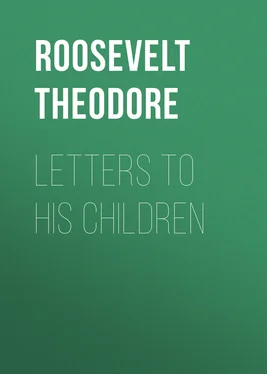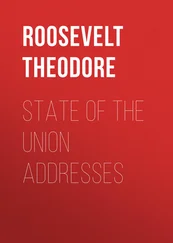Theodore Roosevelt - Letters to His Children
Здесь есть возможность читать онлайн «Theodore Roosevelt - Letters to His Children» — ознакомительный отрывок электронной книги совершенно бесплатно, а после прочтения отрывка купить полную версию. В некоторых случаях можно слушать аудио, скачать через торрент в формате fb2 и присутствует краткое содержание. Жанр: foreign_prose, История, foreign_edu, foreign_antique, на английском языке. Описание произведения, (предисловие) а так же отзывы посетителей доступны на портале библиотеки ЛибКат.
- Название:Letters to His Children
- Автор:
- Жанр:
- Год:неизвестен
- ISBN:нет данных
- Рейтинг книги:5 / 5. Голосов: 1
-
Избранное:Добавить в избранное
- Отзывы:
-
Ваша оценка:
- 100
- 1
- 2
- 3
- 4
- 5
Letters to His Children: краткое содержание, описание и аннотация
Предлагаем к чтению аннотацию, описание, краткое содержание или предисловие (зависит от того, что написал сам автор книги «Letters to His Children»). Если вы не нашли необходимую информацию о книге — напишите в комментариях, мы постараемся отыскать её.
Letters to His Children — читать онлайн ознакомительный отрывок
Ниже представлен текст книги, разбитый по страницам. Система сохранения места последней прочитанной страницы, позволяет с удобством читать онлайн бесплатно книгу «Letters to His Children», без необходимости каждый раз заново искать на чём Вы остановились. Поставьте закладку, и сможете в любой момент перейти на страницу, на которой закончили чтение.
Интервал:
Закладка:
Theodore Roosevelt
Letters to His Children
INTRODUCTION
Most of the letters in this volume were written by Theodore Roosevelt to his children during a period of more than twenty years. A few others are included that he wrote to friends or relatives about the children. He began to write to them in their early childhood, and continued to do so regularly till they reached maturity. Whenever he was separated from them, in the Spanish War, or on a hunting trip, or because they were at school, he sent them these messages of constant thought and love, for they were never for a moment out of his mind and heart. Long before they were able to read he sent them what they called "picture letters," with crude drawings of his own in illustration of the written text, drawings precisely adapted to the childish imagination and intelligence. That the little recipients cherished these delightful missives is shown by the tender care with which they preserved them from destruction. They are in good condition after many years of loving usage. A few of them are reproduced in these pages—written at different periods as each new child appeared in the household.
These early letters are marked by the same quality that distinguishes all his letters to his children. From the youngest to the eldest, he wrote to them always as his equals. As they advanced in life the mental level of intercourse was raised as they grew in intelligence and knowledge, but it was always as equals that he addressed them. He was always their playmate and boon companion, whether they were toddling infants taking their first faltering steps, or growing schoolboys, or youths standing at the threshold of life. Their games were his games, their joys those of his own heart. He was ready to romp with them in the old barn at Sagamore Hill, play "tickley" at bedtime, join in their pillow fights, or play hide-and-seek with them, either at Sagamore Hill or in the White House. He was the same chosen and joyous companion always and everywhere. Occasionally he was disturbed for a moment about possible injury to his Presidential dignity. Describing a romp in the old barn at Sagamore Hill in the summer of 1903, he said in one of his letters that under the insistence of the children he had joined in it because: "I had not the heart to refuse, but really it seems, to put it mildly, rather odd for a stout, elderly President to be bouncing over hayricks in a wild effort to get to goal before an active midget of a competitor, aged nine years. However, it was really great fun."
It was because he at heart regarded it as "great fun" and was in complete accord with the children that they delighted in him as a playmate. In the same spirit, in January, 1905, he took a squad of nine boys, including three of his own, on what they called a "scramble" through Rock Creek Park, in Washington, which meant traversing the most difficult places in it. The boys had permission to make the trip alone, but they insisted upon his company. "I am really touched," he wrote afterward to the parents of two of the visiting boys, "at the way in which your children as well as my own treat me as a friend and playmate. It has its comic side. They were all bent upon having me take them; they obviously felt that my presence was needed to give zest to the entertainment. I do not think that one of them saw anything incongruous in the President's getting as bedaubed with mud as they got, or in my wiggling and clambering around jutting rocks, through cracks, and up what were really small cliff faces, just like the rest of them; and whenever any one of them beat me at any point, he felt and expressed simple and whole-hearted delight, exactly as if it had been a triumph over a rival of his own age."
When the time came that he was no longer the children's chosen playmate, he recognized the fact with a twinge of sadness. Writing in January, 1905, to his daughter Ethel, who was at Sagamore Hill at the time, he said of a party of boys that Quentin had at the White House: "They played hard, and it made me realize how old I had grown and how very busy I had been the last few years to find that they had grown so that I was not needed in the play. Do you recollect how we all of us used to play hide and go seek in the White House, and have obstacle races down the hall when you brought in your friends?"
Deep and abiding love of children, of family and home, that was the dominating passion of his life. With that went love for friends and fellow men, and for all living things, birds, animals, trees, flowers, and nature in all its moods and aspects. But love of children and family and home was above all. The children always had an old-fashioned Christmas in the White House. In several letters in these pages, descriptions of these festivals will be found. In closing one of them the eternal child's heart in the man cries out: "I wonder whether there ever can come in life a thrill of greater exaltation and rapture than that which comes to one between the ages of say six and fourteen, when the library door is thrown open and you walk in to see all the gifts, like a materialized fairy land, arrayed on your special table?"
His love for the home he had built and in which his beloved children had been born, was not even dimmed by his life in the White House. "After all," he wrote to Ethel in June, 1906, "fond as I am of the White House and much though I have appreciated these years in it, there isn't any place in the world like home—like Sagamore Hill where things are our own, with their own associations, and where it is real country."
Through all his letters runs his inexhaustible vein of delicious humor. All the quaint sayings of Quentin, that quaintest of small boys; all the antics of the household cats and dogs; all the comic aspects of the guinea-pigs and others of the large menagerie of pets that the children were always collecting; all the tricks and feats of the saddle-horses—these, together with every item of household news that would amuse and cheer and keep alive the love of home in the heart of the absent boys, was set forth in letters which in gayety of spirit and charm of manner have few equals in literature and no superiors. No matter how great the pressure of public duties, or how severe the strain that the trials and burdens of office placed upon the nerves and spirits of the President of a great nation, this devoted father and whole-hearted companion found time to send every week a long letter of this delightful character to each of his absent children.
As the boys advanced toward manhood the letters, still on the basis of equality, contain much wise suggestion and occasional admonition, the latter always administered in a loving spirit accompanied by apology for writing in a "preaching" vein. The playmate of childhood became the sympathetic and keenly interested companion in all athletic contests, in the reading of books and the consideration of authors, and in the discussion of politics and public affairs. Many of these letters, notably those on the relative merits of civil and military careers, and the proper proportions of sport and study, are valuable guides for youth in all ranks of life. The strong, vigorous, exalted character of the writer stands revealed in these as in all the other letters, as well as the cheerful soul of the man which remained throughout his life as pure and gentle as the soul of a child. Only a short time before he died, he said to me, as we were going over the letters and planning this volume, which is arranged as he wished it to be: "I would rather have this book published than anything that has ever been written about me."
THE LETTERS
IN THE SPANISH WAR
At the outbreak of the war with Spain in the spring of 1898 Theodore Roosevelt, who was then Assistant Secretary of the Navy, in association with Leonard Wood, organized the Regiment of Rough Riders and went into camp with them at Tampa, Florida. Later he went with his regiment to Cuba.
Читать дальшеИнтервал:
Закладка:
Похожие книги на «Letters to His Children»
Представляем Вашему вниманию похожие книги на «Letters to His Children» списком для выбора. Мы отобрали схожую по названию и смыслу литературу в надежде предоставить читателям больше вариантов отыскать новые, интересные, ещё непрочитанные произведения.
Обсуждение, отзывы о книге «Letters to His Children» и просто собственные мнения читателей. Оставьте ваши комментарии, напишите, что Вы думаете о произведении, его смысле или главных героях. Укажите что конкретно понравилось, а что нет, и почему Вы так считаете.












